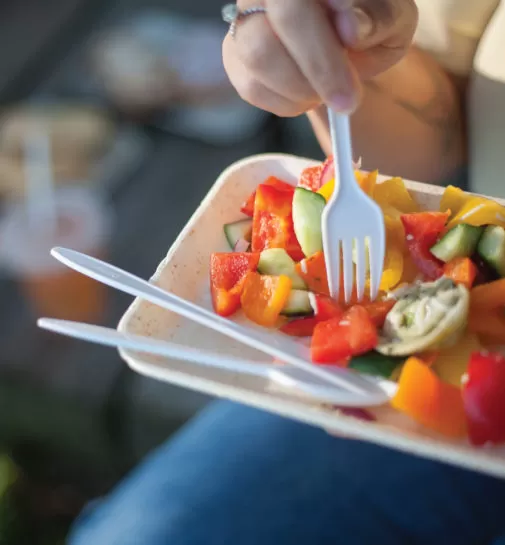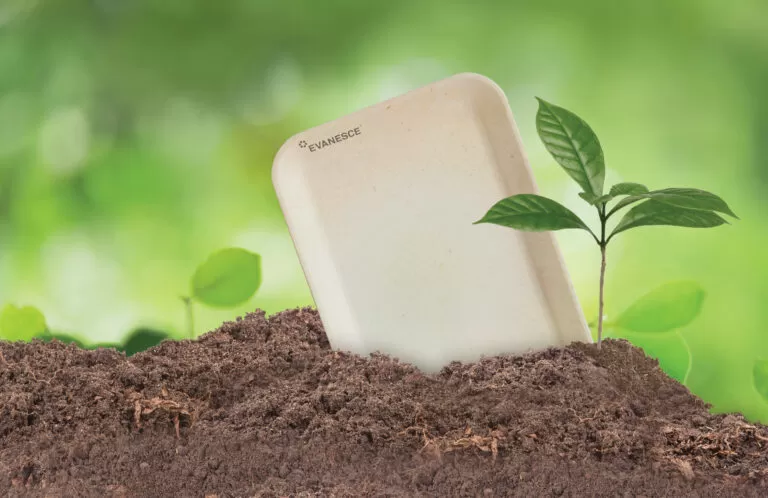As regulatory requirements and consumer demand prompt a shift to more sustainable solutions for the foodservice industry, plant-based packaging like biopolymers can offer a number of benefits. See 5 benefits of using plant-based packaging for the foodservice industry.
Five reasons to use plant-based packaging in foodservice
Single-use plastic is everywhere in food production and foodservice: in yogurt tubs, meat trays, drink containers, takeout boxes and disposable cutlery. And the demand for these single-use plastics and disposables continues to grow.
An estimated 40% of global plastic waste comes from packaging and most of the world’s plastics are sent to landfill or incinerated. As McKinsey points out, they are “lost forever as a resource, in spite of plastics’ potential for reuse and recycling.”
The good news is that the market is growing for sustainable packaging, and the options are growing too. Especially for compostable bioplastics and biopolymers which are made out of plant materials and behave just as fossil-based plastics do.
Here’s why plant-based packaging is the perfect fit for the foodservice industry:
1. Consumers want it.
Across the board, consumers are becoming more and more aware of the environmental impact of our purchasing choices. They know that packaging and single-use plastics are a major part of our waste problem, and they’re demanding change.
And in response, governments are beginning to impose regulations that limit or ban single-use plastics. Consumer pressure and looming regulatory changes mean the market for sustainable plant-based packaging continues to grow.
Studies show that even in spite of the global pandemic, which for a time forced us to abandon our commitment to reusable containers and bags and saw us using more food takeout containers, consumers continue to demand sustainability in packaging. A recent Shorr Packaging study shows Millennials are more likely to seek out products with sustainable packaging, and Gen Z consumers are more likely to pay a premium for it.

2. It can help companies meet regulatory requirements or commitments for packaging sustainability.
As governments begin to impose regulations to reduce waste, companies have begun to respond by adopting plant-based packaging. Major food manufacturers like Danone have adopted the goals set by the Ellen McArthur Foundation, which aims to achieve “100% reusable, recyclable or compostable plastic packaging by 2025.” In many parts of the world, single-use plastic bans have taken effect — or are about to — prompting a shift to sustainable packaging.
3. Compostable packaging can help reduce food waste.
Food waste is one of the major causes of greenhouse gas emissions — in fact, food waste in our landfills is a large source of methane, a greenhouse gas that is 25 times more potent than carbon dioxide at warming our planet.
According to the Sustainable Packaging Coalition, compostable packaging is one way to help reduce food waste in the food service industry, where disposable plates and utensils are destined for the landfill, unrecyclable because of the food residue they carry. When takeout containers, drink cups, and utensils are compostable, they — along with that food waste — are diverted from the landfill and become a way to help battle rising carbon emissions, rather than contributing to them.

4. Plant-based packaging reduces carbon emissions.
The Plant-Based Packaging Council notes that creating packaging from plants “converts carbon in the atmosphere into both an economic value and an environmental benefit.” For starters, replacing traditional materials and chemicals with packaging made from renewable, compostable material eliminates the carbon emissions from production and removes those materials from the waste stream.
Some packaging solutions are made from agricultural waste, which also helps remove another source of waste from our material stream. A story in Deli Business magazine writes that packaging made from agricultural waste or other environmentally sourced solutions “has tremendous upstream environmental benefits in the form of water and energy use efficiencies as well as GHG emissions reductions from the manufacturing of petroleum-based inputs, deforestation and the methane emissions avoidance from rotting agricultural waste.”
5. Composting is part of the circular economy.
Plant-based packaging completes what’s known as a circular material stream, a vital part of the circular economy. The circular economy considers every stage of a product’s lifecycle, from inception to end-of-life — plant-based packaging begins as farmed crops and can end its life either in a backyard compost pile or a commercial compost facility. The material created through composting diverts waste from our landfills and helps enrich our soil, helping improve agricultural yield. It also helps keep our waterways healthy, ensuring nutrients remain where they’re supposed to and improve filtration properties of our soil.
In addition, compost can help soil act as a “carbon sink,” meaning the soil can absorb more carbon than it releases. Forests, for example, are one of the planet’s most effective carbon sinks — but the Marin Carbon Project also revealed that compost can help double the carbon sequestration capabilities of soil.

The future of compostable plant-based packaging
Innovations in compostable packaging are already helping companies swap out traditional packaging for more sustainable options. For foodservice distributors and restaurants, Evanesce is the newest name in plant-based packaging. Our line of high-quality foodservice packaging, Evanesce Biopolymers are made from 100% plant materials and certified commercially compostable.
Evanesce has already begun producing millions of compostable straws in South Carolina that are made from renewable resources such as corn starch and perform just as their plastic counterparts do — only without the environmental impact. Compostable straws are just the beginning — we’re continuing to innovate with our plant-based packaging solutions including Evanesce Biopolymers and our patented technology, Evanesce Molded Starch.
Get in touch with us to request a sample or to learn more about our products.

